|
|
|
Sort Order |
|
|
|
Items / Page
|
|
|
|
|
|
|
| Srl | Item |
| 1 |
ID:
070056


|
|
|
| 2 |
ID:
153710
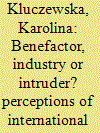

|
|
|
|
|
| Summary/Abstract |
Soon after the breakdown of the Soviet Union in 1991, a civil war started in Tajikistan (1992–97). This was also the period when a number of international organizations arrived in the country to distribute humanitarian assistance and assist in conflict resolution and stabilization. After the UN, the Organization for Security and Co-operation in Europe (OSCE) was the second key organization which appeared in the conflict-stricken country. Like other key international organizations in Tajikistan, the OSCE, which has been in the country since 1994, has seen a shift in its original functions of monitoring and emergency assistance. Some see its avowed objectives in the new century as formalistic, virtual and ineffective. By capturing perceptions of foreign assistance to Tajikistan among employees of the OSCE and other international organizations, NGO workers, government officials and ordinary citizens, this article explores how Tajikistan ‘socialized’ the OSCE, making the organization simultaneously a benefactor, an industry and even an intruder.
|
|
|
|
|
|
|
|
|
|
|
|
|
|
|
|
| 3 |
ID:
006467


|
|
|
|
|
| Publication |
Tampere, PEace Research Institute, 1996.
|
| Description |
171p.
|
| Series |
TPRI Occasional paper; no.65
|
| Standard Number |
9517061579
|
|
|
|
|
|
|
|
|
|
|
|
Copies: C:1/I:0,R:0,Q:0
Circulation
| Accession# | Call# | Current Location | Status | Policy | Location |
| 038212 | 341.242/BOR 038212 | Main | On Shelf | General | |
|
|
|
|
| 4 |
ID:
190070
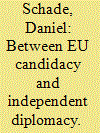

|
|
|
|
|
| Summary/Abstract |
This article considers differentiated cooperation between European Union (EU) member states and third countries in diplomatic statements at the Organization for Security and Cooperation in Europe (OSCE). Using a novel dataset on interventions in OSCE Permanent Council meetings, it analyzes when and why third countries align with the EU's positions. The observed alignment patterns underline the complexity of third country motivations to form part of the EU's diplomatic alliances, such as their institutional proximity to the organization, or their own involvement in regional conflicts. In so doing the article explores the limits of differentiated diplomatic cooperation with the EU in multilateral security organizations. It also points to the constraints the EU faces when trying to establish itself as a relevant player in European and international security through diplomatic acceptance and amplification of its own views by others.
|
|
|
|
|
|
|
|
|
|
|
|
|
|
|
|
| 5 |
ID:
147775
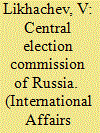

|
|
|
|
|
| Summary/Abstract |
THE SYSTEM OF GOVERNMENT and administration of the Russian Federation includes an effective range of instruments and competences, with each of its actors having its own important function. All this, as the experience of the 21st century makes evident, enables this system to efficiently tackle national and international threats and challenges to the world order.
|
|
|
|
|
|
|
|
|
|
|
|
|
|
|
|
| 6 |
ID:
114731
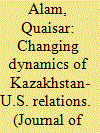

|
|
|
| 7 |
ID:
083348
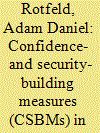

|
|
|
|
|
| Publication |
2008.
|
| Summary/Abstract |
Every region has to elaborate its own confidence- and security-building measures (CSBMs) culture, while not abandoning the basic Organization for Security and Cooperation in Europe (OSCE) accords in this field. CSBMs cannot be seen as an aim in themselves. They have to be incorporated in the broader, emerging security regime. If our security is threatened, both internally and externally (from territories far away from Europe), our counteraction must correspond to the new nature of these threats. Although played down, the concept of CSBMs is not a thing of the past and may be a useful instrument in addressing various kinds of security issues, including those on the Korean peninsula. There is an urgent need to start a serious discussion on the overall concept of arms control and CSBMs and its place in the security-building processes. The main forum for European CSBMs remains the OSCE, although arms control efforts are also being developed outside its remit. The promotion of endeavors in this field would be much enhanced by having the European Union and NATO engaged more deeply in it. The question of CSBM implementation in the contiguous areas of the states which share frontiers with non-European, non-OSCE states remains outstanding. The current circumstances on Europe's perimeter bear evidence that the OSCE community cannot defer the issue interminably. The OSCE Partners for Cooperation need to be further encouraged to follow and get involved in the CSBM/arms control processes.
|
|
|
|
|
|
|
|
|
|
|
|
|
|
|
|
| 8 |
ID:
149725
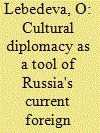

|
|
|
|
|
| Summary/Abstract |
This obviously also applies to Russia's current cultural diplomacy. Yevgeny Shmagin, Deputy Director of the Department on Cultural Affairs and Ties with UNESCO of the Russian Ministry of Foreign Affairs, underscores in his article "Culture and Diplomacy" published in International Affairs the importance of cultural diplomacy in implementing the state's foreign-policy strategy, maintaining, in particular, that "the union of diplomacy and culture has at all times served Russia's national interests, over and over again demonstrating its vitality at different stages in our history. It was cultural diplomacy with its specific set of instruments and methods to influence public opinion that was able to essentially dissolve the ice of hostile and sometimes openly biased attitudes with regard to our country during its Soviet period, mitigating the impact of various negative tendencies of political and ideological nature. During the formation of new Russian state, cultural initiatives once again helped strengthen the country's international prestige, its reputation, demonstrate the Russian society's openness, serve as an evidence of Russia's revival, and its development as a free and democratic state."
|
|
|
|
|
|
|
|
|
|
|
|
|
|
|
|
| 9 |
ID:
097794
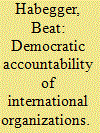

|
|
|
|
|
| Publication |
2010.
|
| Summary/Abstract |
Many international organizations, including the United Nations, are accused of lacking democratic accountability. A variety of proposals have been made to close the gap between their extended influence and the lack of effective controlling mechanisms to prevent abuses of power. This article focuses on one specific proposal: the establishment of parliamentary assemblies. Based on the experiences of the Council of Europe and the Organization for Security and Cooperation in Europe, it presents the factors that enable such assemblies to exercise parliamentary control and influence towards intergovernmental decision-making bodies.The article shows how a parliamentary dimension can be introduced conceptually into the debate on the democratic accountability of international organizations and how these insights support the reflections on a United Nations parliamentary assembly.
|
|
|
|
|
|
|
|
|
|
|
|
|
|
|
|
| 10 |
ID:
151588
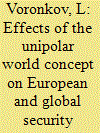

|
|
|
|
|
| Summary/Abstract |
BEHIND THE POLICY of Western countries and their allies toward Russia in the Ukrainian crisis is a long-term strategy adopted by key Western powers, and the Ukrainian conflict is just one manifestation of this strategy. Claims by the United States that it is the world leader, far from raising any objections from its allies, are supported by them in every way.
|
|
|
|
|
|
|
|
|
|
|
|
|
|
|
|
| 11 |
ID:
105274
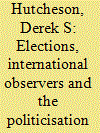

|
|
|
| 12 |
ID:
141447


|
|
|
|
|
| Summary/Abstract |
The Organization for Security and Cooperation in Europe (OSCE) is perhaps the world's least-known major security organization. However, the same characteristic which puts the OSCE seemingly continually on the verge of irrelevance with respect to the other actors in European and global security is in fact what has allowed it to endure and is in fact its greatest asset. That is, the OSCE's distinct combination of modern and postmodern characteristics in both its composition and its activities allows it to create what can be called “embedded security”. Tracing the evolution of one particular set of decision-making rules embedded within a normative framework which questioned the fundamental meanings of “security”, and exploring present-day activities, this article reinterprets the OSCE in the light of this new model. In so doing, it re-contextualizes both the OSCE's origins and its contemporary relevance. Instead of a modernist, functional, rule-driven interpretation which situates the OSCE on the periphery in a crowded field, this explanation puts the OSCE at the centre of the postmodern and normative European security architecture.
|
|
|
|
|
|
|
|
|
|
|
|
|
|
|
|
| 13 |
ID:
085513


|
|
|
|
|
| Publication |
2008.
|
| Summary/Abstract |
This article assesses the relations between the European Neighbourhood Policy (ENP) and EU actions in conflict management in the neighbourhood. It is based on a comparative approach to the EU actions towards tie unsolved conflicts in the Maghreb and in Eastern Europe respectively. It argues that the comparative approach may be used to test the ENP with regarded to its ambitions in conflict management.
|
|
|
|
|
|
|
|
|
|
|
|
|
|
|
|
| 14 |
ID:
140592
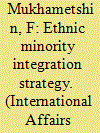

|
|
|
|
|
| Summary/Abstract |
MATTERS RELATED TO LANGUAGE use go beyond the framework of philological disciplines and in some way or other impact various aspects of public life. Language and culture are recognized within the international community as principal "soft power" tools for promoting a country's positive image abroad. In addition to various aspects of language policy in Russia, the joint meeting of the Council on Interethnic Relations and the Council on the Russian Language, chaired by Russian President V.V. Putin, on May 19, 2015, stressed repeatedly the special role of the Russian language in expanding Russia's spiritual and intellectual influence abroad and in the preservation and development of the Russian World. In this context, it is equally important to counter the attempts of certain politicians who build their careers in their home countries on Russophobia, casting the Russian World as a "foreign policy project" of today's Russia, not as an objectively developed form of civilization that should be preserved.
|
|
|
|
|
|
|
|
|
|
|
|
|
|
|
|
| 15 |
ID:
070060


|
|
|
| 16 |
ID:
046442
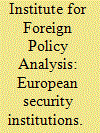

|
|
|
|
|
| Publication |
Brassey's, Institute for foreign policy analysis, 2000.
|
| Description |
v, 247p.
|
| Standard Number |
1574882112
|
|
|
|
|
|
|
|
|
|
|
|
Copies: C:1/I:0,R:0,Q:0
Circulation
| Accession# | Call# | Current Location | Status | Policy | Location |
| 045104 | 341.242/EVR 045104 | Main | On Shelf | General | |
|
|
|
|
| 17 |
ID:
150331


|
|
|
|
|
| Summary/Abstract |
Fifteen countries in Europe are calling for a “relaunch of conventional arms control” negotiations with Russia amid concerns about the deteriorating security situation in their region due to Moscow’s actions in Ukraine.
|
|
|
|
|
|
|
|
|
|
|
|
|
|
|
|
| 18 |
ID:
164206
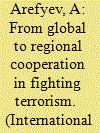

|
|
|
|
|
| Summary/Abstract |
THERE ARE many organizations on the international arena that are in one way or another involved in combating terrorism. Cooperation on the global level proceeds within the framework of the UN and its specialized agencies, Interpol and the Global Initiative to Combat Nuclear Terrorism (GICNT); the OSCE is also becoming actively involved in this process. In the Eurasian space, there are regional organizations, including the Antiterrorism Center of the Commonwealth of Independent States (CIS ATC), the Regional Anti-Terrorist Structure of the Shanghai Cooperation Organization (RATS SCO), the Eurasian Group for the Prevention and Suppression of Money Laundering and Terrorist Financing (EaG), and the Collective Security Treaty Organization (CSTO).
|
|
|
|
|
|
|
|
|
|
|
|
|
|
|
|
| 19 |
ID:
066136
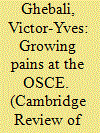

|
|
|
| 20 |
ID:
192452


|
|
|
|
|
| Summary/Abstract |
The American response is all but a model of diplomatic manners compared to NATO's document. NATO sent us such an ideologically motivated answer, it is so permeated with its exceptional role and special mission, that I even felt a bit embarrassed for whoever wrote these texts
|
|
|
|
|
|
|
|
|
|
|
|
|
|
|
|
|
|
|
|
|